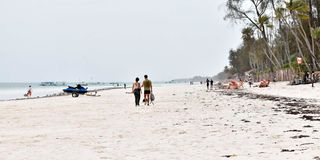Premium
Why counties should boost municipalities

Tourists walk along Diani Beach in Kwale County.
Municipalities in Kenya were established under the Urban Areas and Cities Act of 2011 and designed as urban administrative divisions to manage and govern specific urban areas.
The presence of municipalities largely supports the counties in the management and development agenda at a local and household level.
The roles of municipalities largely involve local development and efficient service delivery in four key areas; Urban planning and development control from zoning regulations to proper land use, infrastructural development such as providing essential services such as water supply, sanitation, waste management, roads, and street lighting; local governance to include community engagements in decision-making processes; economic development that encompasses encouraging business growth through promoting investment, and fostering economic opportunities within the municipality.
Tourist destinations thrive on order and efficiency; the choice to visit a destination for any potential tourist lies in its attractiveness from a clean, safe, and orderly front. Zoning plans for instance allow for planning and management of designated spaces dedicated to tourism activity; these areas can range from souvenir markets to entertainment spots such as nightclubs; facilities such as these may operate in a 24-hour spectrum encouraging both daytime and nighttime activity and promoting businesses alike.
Infrastructure development supports tourism by promoting clean, healthy, and safe destinations. Hotels are among the biggest generators of waste largely due to their operations; by implementing the circular economy approach, municipalities through their waste management function can support such entities in managing their waste. This function is enhanced in destinations that are home to attractions that have very fragile eco-systems such as beach destinations.
Security is a key factor in choosing a holiday destination. The municipalities, through the provision of streetlighting, promote security and safety, allowing tourists to take part in activities at any given time of the day, thus supporting a 24–hour economy.
No tourists want to fall ill when on holiday; ensuring a sufficient supply of water and sanitation facilities reduces the occurrence of tropical and waterborne diseases that may negatively impact a destination.
Green spaces in tourism destinations promote biodiversity, the health, and well-being of its users through rest and recreation, and social well-being.
They play a key role in building climate resilience for destinations by providing buffers to extreme weather conditions in the wake of the visible threats due to climate change; the management of this spaces fall solely under the municipalities; their contribution to a destinations’ allure cannot be overemphasised.
Municipalities provide a great window for Public–Private Partnership engagement on projects dedicated to enhancing the quality of their destinations.
The selection of these boards, though structured, could be configured to include experts in various fields that add value based on the needs of the representative areas. County governments should give autonomy to the municipalities to allow them to perform their functions.
- Ms Ndung’u is the Director, Diani Municipality, Kwale County

